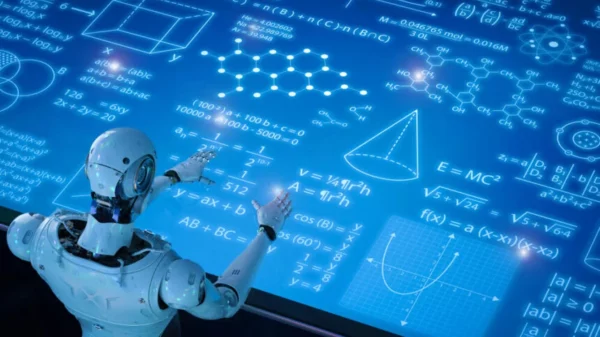The manufacturing industry has redefined the traditional approach in a world where machines think and factories learn. Artificial Intelligence (AI) technologies have greatly contributed to the revolution. Integrating AI-powered innovations such as machine learning, data-driven decision-making, or robotics has brought exponential growth, be it gears, wrenches, or algorithms and data.
The AI revolution has tackled age-old challenges and unleashed an era of smarter and more efficient production processes. There are comprehensive market statistics to showcase AI’s growth. According to that, there’s been a 57.2% CAGR growth from 2021, estimated to reach $16.7 billion by 2026. The World Economic Forum’s survey also showed that 70% of manufacturers have already invested in AI-driven technologies.
Top 7 Use Cases of AI In Manufacturing
As the world is at a stage of digitized outlook, manufacturers are eager to up their competitive game. To help industries and manufacturers with the same, artificial intelligence has brought in automation and introduced innovative solutions.
-
Predictive Maintenance
Predictive maintenance is one of the most prominent uses of AI in the manufacturing sector. Predictive maintenance technology analyzes real-time data and performance patterns that further predict equipment failures or malfunctions. Shell adapted to AI predictive maintenance for their pieces of equipment. Such types of equipment included pumps, compressors, and turbines.
-
Robotics & Automation
Robotics and automation have become compelling components in the modern manufacturing spectrum. One of the major reasons behind this obligation is its scalability feature. With increasing demand, manufacturers could resort to mechanical or virtual machines for upscaling the production output at the same labor cost-effectively. The famous electric vehicle company Tesla adopted automated assembly lines and AI-powered quality control systems.
-
Product Design & Prototyping
Product design and prototyping is yet another critical manufacturing stage where AI has prominently brought in revolutionization. One such AI technological advancement is Computer-Aided Design. This allows designers to visualize the designs virtually. Testing designs allows engineers to incorporate structural integrity and improve aerodynamics. This is why General Electric ( GE) Aviation simulated AI in producing their complex aircraft engine components.
-
Process Optimization & Quality Control
Process optimization and Quality Control are the most important aspects all manufacturing units aspire to. Similarly, Siemens Healthineers, one of the globally reputed healthcare brands, utilized various machine learning algorithms for performing quality checks on medical equipment. Some of the devices they performed quality control were diagnostic imaging systems and a few additional laboratory equipments.
-
Supply Chain Optimization
Supply chain optimization is important for fulfilling the market demand, enhancing inventory management, and improving as a supplier. Focusing on the same advantages, Johnson and Johnson incorporated AI into the supply chain. Doing so ensured the availability of their products by data analyzing their inventory levels and production schedules.
-
Demand Forecasting
Demand Forecasting helps in anticipation of the customer’s needs and preferences. This is why one of the leading global brands, Amazon, used demand forecasting in their manufacturing. As an e-commerce and technology company, Amazon uses sophisticated AI algorithms to estimate past sales data history. Further, it adjusts and manages its logistics and distribution network influenced by the analyzed demand forecast.
-
Risk Management and Fraud Detection
A leading German multinational company, Siemens AG, has recently implemented Risk management and fraud detection as a prominent part of its manufacturing process. This helps them detect any irregularities in the production unit. This is of great help since they can respond to the issue immediately and protect their businesses with an optimized operation.
Challenges of Implementing AI in Manufacturing
-
High Initial Investment
High Initial Investment is one of the primary challenges a manufacturing unit has to face in implementing AI in their production process. Since incorporating AI tools and skills is a long-term capital investment. Hence the initial cost usually rounds up high. Investments such as setting up the infrastructure, hiring a trained workforce to manage and implement AI systems, and collecting relevant data across platforms are to be taken care of.
-
Interoperability & Standardization
Manufacturing is one of the oldest sectors; hence, integrating AI technologies into the existing systems could be challenging. Moreover, adding to the issue of adaptation, the manufacturing sector needs to have well-defined standards and guidelines for manufactured products. This could become a major issue that can hinder the upscale of products.
-
Security & Privacy Concerns
With artificial intelligence’s interconnection with the manufacturing process, they have become the target of cyberattacks. This could result in the potential exploitation of intellectual property, such as the designs and manufacturing process.
-
Ethical Considerations
A major reason for ethical considerations concern is that AI mainly works on data collection from various sources. Hence ensuring data privacy and unbiased algorithms is a concern amongst manufacturers and customers in the sense of liability.
Benefits of Artificial Intelligence (AI) in Manufacturing
-
Improved Efficiency and Productivity
Improved Efficiency and Productivity are among the most prominent benefits a manufacturing sector can avail for integrating AI. A major reason behind this is that AI algorithms can analyze vast amounts of data to optimize the supply chain and continuously improve new product development.
-
Data-driven Decision Making
The data-Driven Decision-Making feature of AI is a key advantage in the manufacturing unit since it ensures high accuracy and efficient workforce utilization, incentives reducing the overall production cost.
-
Remote Monitoring and Management
The manufacturing sectors gain real-time data on their equipment’s performance by referring to an AI’s Remote Monitoring and Management features. This early analysis of the potential problems results in overall equipment effectiveness and enhanced resource maximization.
-
Enhanced Product Design and Innovation
Another benefit manufacturing units get with the integration of AI in their production process is Enhanced Product Design and Innovation. Since machine learning algorithms simulate a particular design virtually based on multiple parameters making your design more prevalent in the market, these parameters could be performance, cost, market trends, or customer preferences.
-
Customization and Personalization
Customization and Personalization are other benefits of AI in production units. Manufacturing is one industry where production is dedicated to customer demands, preferences, and market relevancy. In such a situation, AI helps gather customer data through past purchases very efficiently. Based on which manufacturing units can operate their production and create an emotional connection with their customers by providing personalized products.
Conclusion
To summarize this discussion on the revolution that artificial intelligence has brought to the manufacturing sector, it is safe to say that the new era and futuristic vision are close.
The prominent players in the list of leading global brands have already adapted to AI technologies, this has helped them grow tremendously and stand out from the competition and revolutionized their entire work process.
Where the manufacturing sector has gained success and enhanced its production process, on the same hand, but facing some challenges like high initial investments, reinforcing a new approach to the manufacturing process.
AI is permanently transforming manufacturing, providing business owners with a competitive edge through the adoption and implementation of cutting-edge technologies.
Patrick R, A techno-commercial leader heading Intuz as Director of Growth With over 12 years of experience in the field of Information Technology. His experience and expertise will entice developers and business entrepreneurs with rich content on latest technology stack. Visit for more information: https://www.intuz.com/


























































































































































































